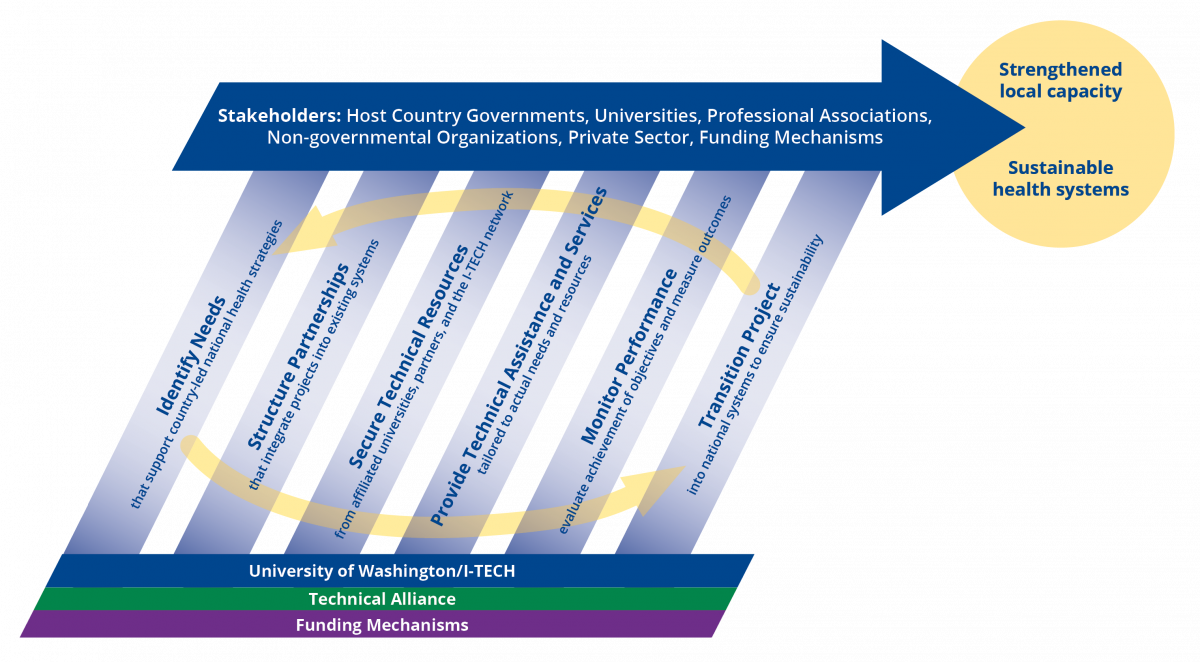
The International Training and Education Center for Health (I-TECH) works in partnership with host country governments, universities, professional associations, non-governmental organizations, private sector groups and funding agencies to strengthen local capacity and build sustainable health systems.
I-TECH follows a partnership model that guides the provision of technical services and technical assistance toward local ownership and sustainability, creating projects and programs that can be readily transitioned into national systems.
Based at the University of Washington, I-TECH draws upon a strong global network of public health professionals. The approach described in this document is customized in each country to respond to local needs and priorities. In addition, each I-TECH country office team aligns the model with the unique Partnership Framework Implementation Plans of the partner host government.
1. IDENTIFY NEEDS in consultation with host country governments
I-TECH works with host country governments to assess existing health systems and identify specific areas where the delivery of health care could be improved. This early collaboration helps to ensure that technical assistance accurately reflects the country’s specific health strategies and priorities.
2. STRUCTURE PARTNERSHIPS that integrate projects into existing systems
In each partnership, I-TECH develops roles, responsibilities, and timelines based on a long-term vision of integrating projects into existing national systems. As part of this vision, I-TECH recognizes and leverages the strengths and resources of national systems, building on and maximizing these efficiencies. The partnerships that emerge are attuned to the needs, realities, and structure of host country systems. Thus, they build and maintain lasting capacity within host country systems, maximize cost-effectiveness, and produce projects that can be more readily scaled up to meet national goals.
3. SECURE TECHNICAL RESOURCES from affiliated universities, partners, and the I-TECH network
As a center based at the University of Washington, I-TECH has direct access to a wide variety of technical specialists. In addition, I-TECH draws upon a robust global network of locally based public health professionals. These specialists provide a wide range of technical expertise to meet project needs.
4. PROVIDE TECHNICAL ASSISTANCE AND SERVICES tailored to actual needs and resources
I-TECH is committed to technical services and technical assistance approaches that build upon and support the existing strengths of local health systems. In addition, I-TECH prioritizes the use of local and regional expertise, an approach that builds the capacity of local experts to meet locally determined needs.
5. MONITOR PERFORMANCE; evaluate achievement of objectives and measure outcomes
I-TECH implements projects within a quality improvement framework designed to track progress in institutional capacity building and guide successful implementation. Using the framework, implementers monitor the progress of each project against specific benchmarks of success; for example, the progressive transfer of skills and capacity to local institutions. This methodology ensures that objectives are met and provides data to adjust approaches as projects evolve.
6. TRANSITION PROJECT into national systems to ensure sustainability
The ultimate goal of I-TECH’s partnership model is to improve health outcomes by strengthening local capacity and building sustainable health systems. I-TECH’s technical services and technical assistance are tailored from the initial planning stage to produce projects that can be successfully absorbed into national systems within mutually determined and realistic timeframes. Recognizing that a successful transition takes time, I-TECH offers transition support in a variety of technical areas including quality improvement and grant management.

